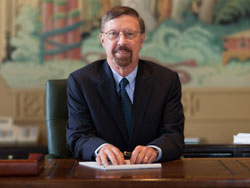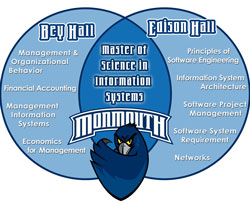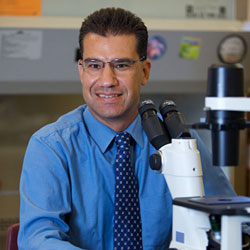Questions About Title IX, Wilson Hall Controversy and the Strategic Plan Answered

With many changes to the University in this past academic year alone, President Paul Brown has had a lot on his plate. The Outlook had the chance to sit down with him and talk about his past and how it affected his decisions at the University this year.
What was your childhood like?
I grew up in Lancaster, PA on a farm that was right in the middle of Amish Country. My family had been there for generations. I had a very simple upbringing. The schools that I went to had about 10 or 12 students in a class. It was rural, but I loved it. I had three older brothers and they showed me the ropes. It was fun being the youngest.
My parents were pretty stern. They were loving but they were stern. My father worked for the state of PA as a farm inspector. I would go with him sometimes when he worked and I would see how he was good, but stern particularly in that type of role as an inspector.
My embracement of diversity came from my mother. We lived in an area that was very insular; all white, methodist, and catholicism was a big deal. I loved that, but my mother would make sure that we had chances to get out of that environment. She would take us on trips to purposely have us out of Lancaster county. She was very accepting. I know that it was because she came from an incredibly stern family, and she reacted to that.
Where did you go to college?
I was a first generation college student at Franklin & Marshall. My parents did not go to college, and neither did any of my older brothers. My parents were so incredibly supportive, but they were not quite sure what I was up to.
Franklin & Marshall is a small liberal arts school with about 2,500 undergraduates. My daughter Emma, is there now.
What advice do you have for student from your own college experience?
I have met students who sheepishly say that they are not sure what they want to major in. I would tell any student who says that to celebrate not knowing, because they’ll get the answer eventually. I really had a great experience at Franklin & Marshall but I wasn’t sure what I wanted to major in. I floundered, but I wonderfully floundered.
I wouldn’t advise students to wait till their senior year, but students can celebrate not knowing for the first few semesters, as I did. I will never forget registrar Miss Gibel who called me into her office during my second semester second year, and said ‘Mr. Brown we have a problem.’ I asked her what it was, and she said, ‘You don’t have a major. Tomorrow you’re going to be back in my office and you’re going to have a major.’ The next day I did chose a major, and it was economics.
How were you informed of the recent Title IX complaint filed by a student?
I found out through Tara Peters, our Associate Vice President for Marketing & Communications. Her staff, among other things, have the key job of of constantly following every format of media. We are very sensitive, as we should be, of where, in any form, the Monmouth name is out there. She alerted me that there was an embargo of an article that would be published from the organization End Rape on Campus.
How did you react to the Title IX allegations?
As soon as there is something that is going to affect the university experience for my faculty, my students, and my staff I immediately investigate. And by that I mean we want to understand what the issue is. So what I did very quickly was say ‘Tara, help me. What is this about? What is the situation? What is the situational analysis?’ I met with Tara, my general counsel, Nina Anderson from the Office of Equity and Diversity, and the Title IX coordinator that I have here on campus.
I fret about the safety of my students. I don’t fret about the quality of the experience I give my students, or whether we are winning or losing games, I fret about whether my students are safe. We have spent decades, as every sophisticated university has, trying to ensure that we do everything we can to preclude sexual assault on campus.
So I heard about it through Tara and then we investigated. When we investigated we found that there was a filing with OCR (Office of Civil Rights) of potential allegations against Monmouth. So we immediately discerned where we were with that. It turns out there have been no filings by OCR against Monmouth. It could happen but to date there have been no formal complaints by OCR against Monmouth University.
What did you do in response to the Title IX filing?
A week or two after the allegations came out I hired outside counsel. I have contracted and hired a law firm to do a complete top to bottom analysis of all our processes and procedures related to Title IX and sexual assault. This analysis is going on right now. Yes, there have been no allegations, but they could be coming. I decided to use the moment to do a comprehensive analysis, so I hired an outside firm lead by an individual who is actually an outside specialist in Title IX sexual assault. This comprehensive analysis is going to go on into the summer.
If the results are confirmatory, then that’s great. If the results are that we could get better in an area, then we will get better in that area. I am sensitive to wanting to make sure that this is a safe campus.
In this particular area the biggest challenge, nationwide, is underreporting. It is just sad, nobody should have to hold in their pain. I have these conversations with my daughter, and I have 3,000 other daughters here.
The most we can do to stop underreporting is continue talking about it; sexual assault is not a stigma. The mere fact that we are constantly talking about this issue matters. I wish I had the silver bullet, the answer, but I think a couple of things you have to do immediately is to talk about it. We talk to the men, and we talk to the women about it. I think that education, and awareness are keeping the topic in the forefront.
What are your thoughts on the Wilson Hall controversy?
I have not taken a position yet, because it is not clear honestly. If it were clear I’d be right out there front and center with everyone else. However, a couple things are clear to me. Something is going to happen here. We don’t know what the something is, but something is going to happen.
We might retain the name, but then there would be incredible awareness. If we don’t retain the name we will have to explain why we’re doing that and the justifications for doing that. I am more interested in knowing to date that the dialogue is where it should go. This is squarely in the hands of the Board of Trustees. That’s why we are having sessions with the Board, we have one coming up next week, and we have had several sessions already. The Board is also holding special meetings to look at all of the input.
A decision will be made over the summer. I predict that a decision will be made towards the end of June, and it will be any version of what I just said. But the Board has been very clear that they have embraced the conversation and that they will be thinking thoroughly through a final decision.
We are not unique in these conversations, and Princeton just came out with many positions. But that is Princeton, and we are not Princeton. We need to do what’s right for us.
Monmouth pays considerably lower adjunct salaries compared to other NJ institutions, what do you have to say about that?
I would state first that over time the percentage of our instructional hours that are going to be delivered by adjuncts will go down. And I don’t mean that negatively towards adjuncts but a student walking away from Monmouth should have incredible set of experiences with a large set of faculty. It is much easier for students to build lifetime relationships with full-time faculty than adjuncts, because they are here full time.
I don’t mean any of this negatively towards our adjuncts, because we have some fantastic faculty that are adjuncts, and there are niches that adjunct faculty are crucial for. But you are asking full-time faculty to do more than what an adjunct does. Full-time faculty are teaching, they serve on committees, they mentor clubs, are involved in activities. Eventually the quality of the experience will go up when we have less adjuncts but not at the expense of the quality of those adjuncts.
A second honesty is that every time we hire somebody we are looking at the competitive market. We are paying adjuncts based on what the market requires, and frankly I will pay what an adjunct demands based on our market, which may be different than another market. The adjunct faculty based in New York City get paid much higher, while adjuncts at Ocean County probably are paid less.
What is one of the most important things that you’re working on through the strategic plan?
By far, I want to have a rigorous liberal arts foundation that allows a student to identify their passion so they can prepare for life after Monmouth. I want them to have a plan, and that is the core of our strategic plan. I don’t want students falling through the cracks. I don’t want students telling me that they never heard of career services, or that they didn’t get help from an advisor.
I think our EOF (Educational Opportunity Fund) students, our honors students, and our athletes are served wonderfully, but I want everybody to have that. I won’t stop until we don’t have students falling through the cracks. Students fall through the cracks for lots of reasons; they might have come here but they maybe had an unstable personal life, or they didn’t have the right educational background, or they drink too much.
Do you disguise yourself?
I used to think that I should wear a hat and glasses, but the goatee is a giveaway, I know that I am visible. I love going to sporting events, and the theatre. People: students, and staff, will holler at me, and I’ll just holler back. I am fine with being recognized. When all the basketball huballa was going on people would constantly call out to me. I literally was just at the bank, and someone hollered ‘Go Hawks.’
Where do you see yourself in five years?
I can see five years out that I am going to be right here, and hopefully at a point where we have taken Monmouth through an implementation of the strategic plan.
PHOTO COURTESY of Mark Ludak


